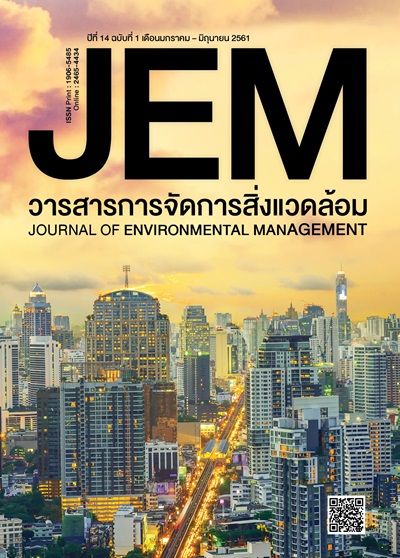บททบทวนความรู้ว่าด้วยกรอบกระบวนทัศน์การจัดการขยะของสังคมโลก A Review of Solid Waste Management Paradigm Shift in the Global Society
คำสำคัญ:
กระบวนทัศน์การจัดการขยะ, ฐานคิดการจัดการขยะ, พัฒนาการการจัดการขยะบทคัดย่อ
บทความมีวัตถุประสงค์เพื่อทบทวนกรอบกระบวนทัศน์การจัดการขยะของสังคมโลกที่เปลี่ยนแปลงไปในแต่ละช่วงเวลา โดยมีข้อสมมติฐานว่ากระบวนทัศน์การจัดการขยะของสังคมโลกมีการเปลี่ยนผ่านทางความคิดในหลายเรื่อง แต่ความคิดเหลักว่าด้วยการจัดการขยะโดยรัฐยังคงเป็นกระแสหลักในปัจจุบัน วิธีการศึกษาเน้นการทบทวนเอกสารเป็นหลัก
กว่า 8 ทศวรรษ สังคมโลกมีพัฒนาการและข้อถกเถียงต่อกระบวนทัศน์การกำหนดนโยบายการจัดการขยะอย่างต่อเนื่อง เริ่มต้นจากกระบวนทัศน์ว่าด้วยการกำจัด ระหว่างหลังสงครามโลกครั้งที่ 2 ถึงทศวรรษ 2510 ถัดมาเป็นกระบวนทัศน์ว่าด้วยขยะเพื่อพลังงาน (ปี 2513-2528) กระบวนทัศน์ว่าด้วยการนำขยะกลับมาใช้ซ้ำและนำมาแปรรูปกลับมาใช้ใหม่ (ปี 2528-2538) กระบวนทัศน์การบูรณาการการจัดการขยะชุมชนอย่างยั่งยืน (ปี 2538-2548) กระบวนทัศน์ว่าด้วยการพัฒนาแนวคิดขยะฐานศูนย์ เป็นแนวคิดการจัดการขยะระหว่างปี 2548-2563 และกระบวนทัศน์ว่าด้วยเศรษฐกิจวงรอบหมุนเวียน ถูกเสนอแนวคิดตั้งแต่ทศวรรษ 2510 มีการพัฒนาอย่างจริงจังตั้งแต่ทศวรรษ 2550 เป็นต้นมา อีกกระบวนทัศน์หนึ่ง ว่าด้วยแบบจำลองการจัดการขยะถูกเสนอไว้ 4 แบบจำลอง คือ แบบจำลองทั่วไปว่าด้วยการจัดการของรัฐ แบบจำลองการแยกทิ้งกำจัด แบบจำลองการสร้างมูลค่าต่อการใช้ต่อเนื่อง และแบบจำลองการเชื่อมโยงไหลเวียนการใช้วัสดุ ผลสรุปการทบทวนได้ดังข้อสมมติฐานดังกล่าว
References
DEFRA. (2011). The Economic of Waste and Waste Policy. Waste Economics Team, Environment and Growth Economics, Department for Environment, Food & Rural Affairs, London, UK.
Deumling, R. (2001). The Future of “Waste”: etymological and conceptual foundations of solid waste management. Energy and Resources Group, University of California at Berkeley.California. USA
Dijkema, G.P.J., Reuter, M.A., & Verhoef, E.V. (2000). New paradigm for waste management.Waste Management, 20(8), 633-638.
Forsyth, T. (2005). Building deliberative public–private partnerships for waste management in Asia.Geoforum, 36, 429–439.
Geissdoerfer, M., Savaget, P., Bocken, N., & Hultink,.E.J. (2017). The circular economy - A newsustainability paradigm?. Journal of Cleaner Production, 143(1), 757-768.
Hallowes, D. & Munnik, V. (2008). Wasting the nation making trash of people and places. TheGroundwork Report. Groundwork: Pietermaritzburg.
Kirchherr, J., Reike, D., & Hekkert, M. (2017). Conceptualizing the circular economy: An analysis of 114 definitions. Resource, Conservation and Recycling. 127, 221-232.
Korhonen, J., Honkasalo, A., and Seppala, J. (2018). Circular economy the concept and its Limitations. Ecological Economics, 143, 37-46.
Korse, M. (n.d.). Resource Hierarchy Explained. Retrieved August 2, 2016, from https://blog.mauritskorse.nl/en/2016/01/waste-hierarchy-explained/
Lansink, A. (2015, June 18-19). From waste - to resource-management, The Ladder of Lansink:Instrument for the (third) transition to circular economy. Third International Conference onWaste Management (ICWM), Pisa, Italy.
Ministry for the Environment, New Zealand. (2002). The New Zealand Waste Strategy: Towards Zero Waste and a sustainable New Zealand. Auckland, New Zealand.
Nordman, B. (1995a). Celebrating consumption. Lawrence Berkeley National Laboratory. CA.
Nordman, B. (1995b). What is waste. Lawrence Berkeley National Laboratory. CA.
OECD. (2004). Addressing the Economic of Waste. Organisation for Economic Co-operation and Development, France.
Oral, M. (2009). Green supply chain management research: ontological and epistemological issues.Interuniversity Research Centre on Enterprise Network, Logistics and Transportation(CIRRELT).
Pongracz, E. (2002). Re-defining the concepts of waste and waste management: evolving the theory of waste management. Department of Process and Environmental Engineering,University of Oulu, Finland.
Pongracz, E., Phillips, PS., & Keiski, RL. (2004, September 28 – October 1). Evolving the theoryof waste management-implications to waste minimization. Accepted to the Waste Management 2004 Conference, To be presented Rhodes, Greece
Rossem, CV., Tojo, N., & Lindhqvist, T. (2006). Extended producer responsibility: An examination of its impact on innovation and greening products. The International Institute for Industrial Environmental Economics (IIIEE), Lund University, Sweden.
Satterthwaite D., Mitlin, D., & Patel, S. (2011). Engaging with the urban poor and their Organisation for poverty reduction and urban governance, issues paper for United Nation Development Programme. New York, USA.
Seldman, N. (2005). Zero waste as the last solid waste management paradigms, in GRC International Dialog White Paper: Proper Discard Management in the New Millennium, San Francisco,CA, August 26 & 27, 2004. Institute for Local Self-Reliance, Washington, DC, USA.
Su, B., Heshmati, A., Geng, Y., & Yu. X. (2013). A review of the circular economy in China: movingfrom rhetoric to implementation. Journal of Cleaner Production, 42, 215-227.
United Nation. (1987). Report of the World Commission on Environment and Development: OurCommon Future. World Commission on Environment and Development, United Nation.
UNEP & ISWA. (2015). Global Waste Management Outlook. International Environmental TechnologyCentre (IETC), Division of Industry, Technology and Economic, UNEP.
Vergara, S. E. & Tchobanoglous, G. (2012). Municipal solid waste and the environment: A globalperspective. Annual Review of Environment and Resources. 2012(37), 277-309.
World Bank. (2012). What is waste: A global review of solid waste management. Urban Development & Local Government Unit, The World Bank, Washington DC.
Zhijun, F. & Nailing, Y. (2007). Pitting a circular economy into practices in China. Sustainable Science, 2007(2), 95–101.


